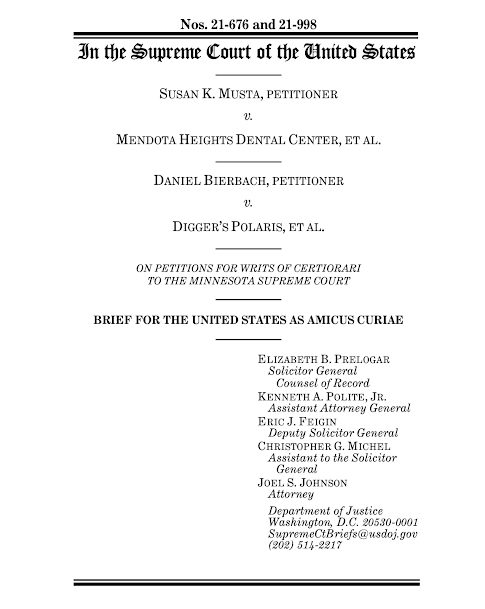The US Government filed an amicus curiae brief requesting that the US Supreme Court (SCOTUS) not review the Minnesota Supreme Court’s decision prohibiting reimbursement of medical marijuana costs in a workers’ compensation claim. The US Government was invited to submit a brief by SCOTUS. Musta v. Mendota Heights Dental Center, et al., No. 21-998.
The question presented is: “Whether the Controlled Substances Act, 21 U.S.C. 801 et seq., preempts a state workers’ compensation order that compels an employer to reimburse an employee for the cost of marijuana used in response to pain arising from a work-related injury.”
The issue is whether employers and/or their insurance carriers could be compelled to reimburse costs for medical marijuana in light of the Controlled Substances Act (CSA or Act), Pub. L. No. 91-513, Tit. II, 84 Stat. 1242.
The Government reasoned that too few state courts of last resort have ruled upon the issue to date and the case law was still developing.
“Although petitioners identify a narrow conflict on the question presented—with the highest courts of Minnesota and Maine invalidating workers’ compensation orders requiring reimbursement for marijuana and the highest courts of New Hampshire and New Jersey up- holding them, see Musta Pet. App. 18a-21a—that disagreement does not warrant this Court’s review. The disagreement is limited and recent, with three of the four decisions coming in 2021. And it is unclear how many additional States interpret their state workers’ compensation schemes, standing alone, to require such reimbursements, or what the limits of such a state-law reimbursement obligation might be. See, e.g., Wright’s Case, 156 N.E.3d 161, 171-175 (Mass. 2020) (interpreting state law not to require such reimbursement in part to avoid preemption concerns); cf. Bierbach Pet. App. 2a (declining to resolve various state-law questions).”
“Furthermore, no state court of last resort has issued a decision that provides an appropriate backdrop for this Court’s review of the obstacle-preemption issues that are inherent here. The Minnesota and Maine courts relied only on impossibility preemption. Musta Pet. App. 29a & n.16; Bourgoin v. Twin Rivers Paper Co., LLC, 187 A.3d 10, 22 (Me. 2018). The New Hampshire court addressed obstacle preemption briefly, noting that the insurer in that case had made its argument “in a single sentence.” Panaggio, 260 A.3d at 837. And the New Jersey court’s preemption analysis turned entirely on its flawed reading of the appropriations riders. Hager, 247 A.3d at 886-888. Given the novelty of the issues, this Court would benefit from further development of the relevant preemption questions in the lower courts before potentially addressing them itself.”
The US Government indicated that the issue is not ripe and may in fact be decided by the other branches of the Federal government. “The Legislative and Executive Branches of the federal government are best situated to consider any potential tailored measures to address specific instances of interaction between federal and state marijuana laws. To that end, Congress has recently amended the federal prohibition on marijuana, see p. 5, supra (noting 2018 change to CSA definition of marijuana), and continues to consider more expansive approaches; indeed, shortly after the Court issued its invitations in these cases, the House of Representatives passed legislation that would remove marijuana from the CSA’s list of controlled substances altogether.”
SCOTUS receives over 8,000 petitions for certiorari per year and only accepts one percent for review. Four of the nine justices must vote in the affirmative to accept a case for oral argument.
Recommended Citation: Gelman, Jon L., US Requests that SCOTUS Not Review Medical Marijuana Reimbursement Issue, Workers' Compensation Blog, May 16, 2022), https://workers-compensation.blogspot.com/2022/05/us-requests-that-scotus-not-review.html
To read more about marijuana and workers' compensation, click here.
Related Articles:
What is our COVID-19 Future? 4/26/22
OSHA Fines Roofing Company $360,531 4/20/22
Injury Caused by Defeated Machine Guard Results in OSHA Fine of $159,522 4/13/22
EPA Proposes to Ban Ongoing Uses of Asbestos 4/5/22
The Effects of Obesity on an Injury 3/31/22
….
Jon L. Gelman of Wayne, NJ, is the author of NJ Workers’ Compensation Law (Thomson-Reuters) and co-author of the national treatise, Modern Workers’ Compensation Law (Thomson-Reuters). For over five decades, the Law Offices of Jon L Gelman 1.973.696.7900 jon@gelmans.com have represented injured workers and their families who have suffered occupational accidents and illnesses.
Blog: Workers ' Compensation
Twitter: jongelman
LinkedIn: JonGelman
LinkedIn Group: Injured Workers Law & Advocacy Group
Author: "Workers' Compensation Law" Thomson-Reuters

